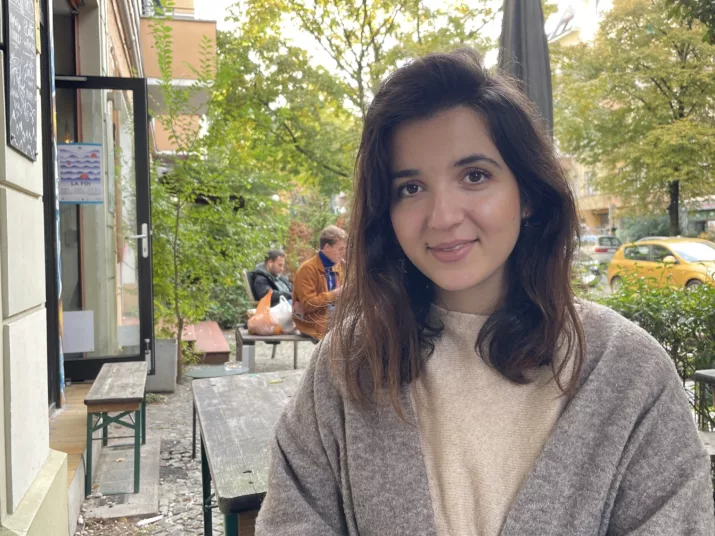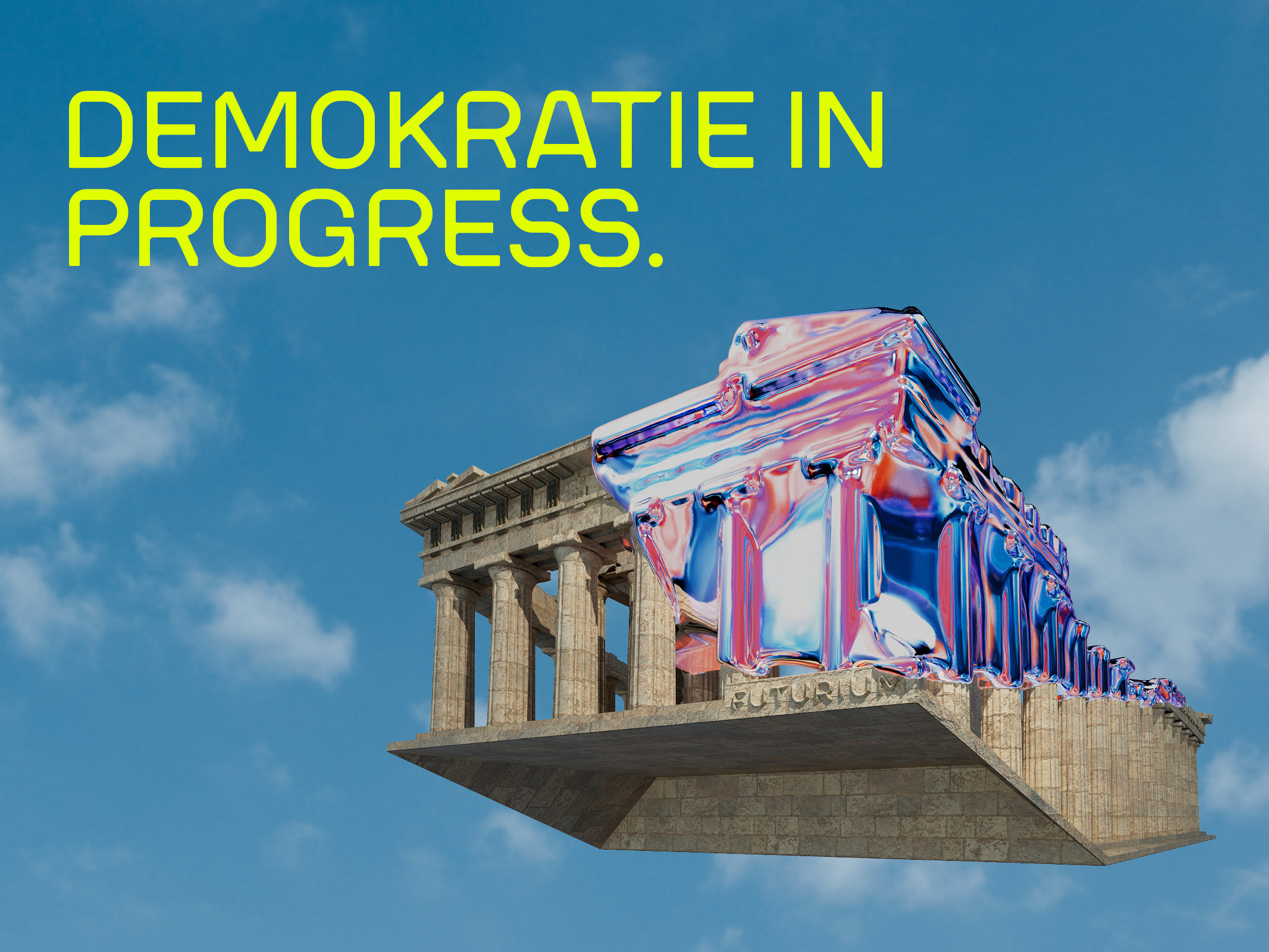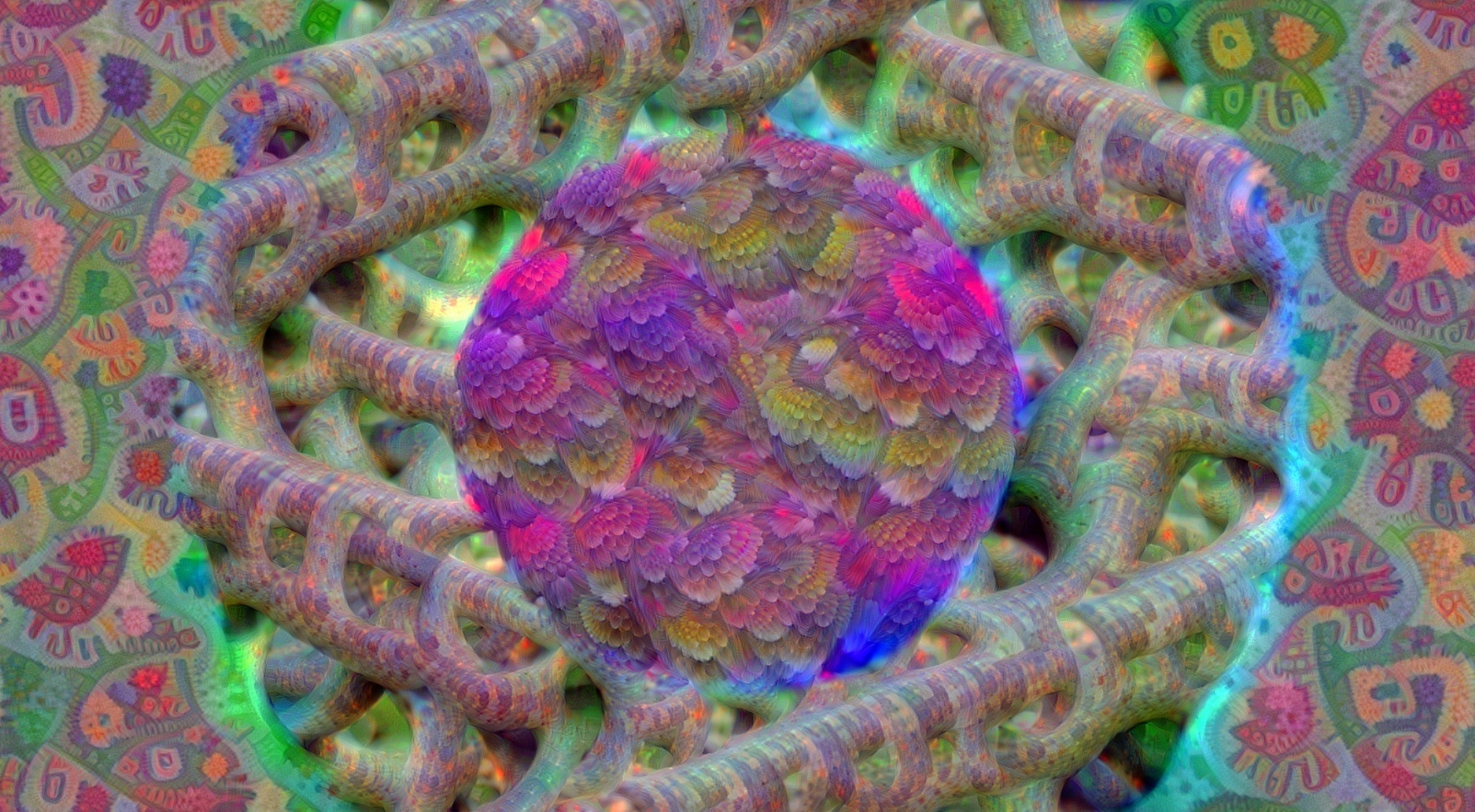
Roxana Samadi is an actress and filmmaker living in Berlin. Photo: Ludmilla Ostermann
“We fail to realise that democracy is also fragile”
Actress Roxana Samadi plays one of the main characters in the German TV series “Para – Wir sind King” (“Para – We are King”) and has also lent her voice to the cat Findus in the animated films of the adventures of “Pettson and Findus”. In the Futurium exhibition, she is the physical embodiment of democracy and seeks out face-to-face exchanges with visitors. Editor Ludmilla Ostermann spoke to her about political responsibility, the importance of empathy and how our connections with one another extend far beyond borders.

Roxana Samadi is an actress and filmmaker living in Berlin. Photo: Ludmilla Ostermann
Would you say you’re a political person?
Roxana: I don’t like describing myself as political. As part of society, we’re all automatically political. Being non-political is political too. I’m active, but not an activist. I’m aware that I’m an active part of this society and try to play my part in shaping it. I try to be perceptive and reflective, to act in a humane way.
Is that easier to accomplish in acting or filmmaking than in other areas of life?
Roxana: Yes, because I’m allowed to be a mirror and don’t make judgements. In today’s world, we do this far too often; the beautiful thing about art is that you can generally take the judgement out and get to grips with what lies behind things. When I’m acting, I can immerse myself in roles that are actually alien to me. This allows me to develop empathy for people, structures and backgrounds that I’m unfamiliar with. At a stroke, I make them my own and look at the world through different eyes. I perceive people differently because I recognise and understand them from the characters I embody.
Are you thinking of a specific role?
Roxana: In the series “Para – We are King”, the girls come from a different social background than my own. I’m from the very privileged Cologne-Klettenberg, which is all-white. But this is something I’ve only come to realise since living in Berlin. I once played a pregnant woman in the crime series “Tatort” and dealt intensively with pregnancy, and now I have a completely different understanding of what it means to be pregnant.
As a filmmaker, you’re currently producing a documentary about the feminist revolution in Iran. Tell us more!
Because at its core, it’s about what it means to be human.
Roxana: I’ve been accompanying nine female protagonists for a year, exploring the question of what it feels like from exile to observe and help shape a revolution. What’s happening here in Germany is unique; the dialogue between the outside and inside of Iran has been of cardinal importance for the movement. The energy literally leapt from over there to over here: each time the protest in Iran got louder, it crossed over to us and it got louder here too. This just goes to show that we’re all connected, and humanity doesn’t stop at a border that may have been drawn in our heads. The motto of the feminist movement is “Woman, Life, Freedom” – a universal code for freedom and equality everywhere in the world, whether in Iran, Afghanistan, Palestine or elsewhere. It touched me so deeply that I wanted to capture it and make it accessible to everyone. Because at its core, it’s about what it means to be human.
In the Futurium exhibition, you are the personification of democracy. Did you hesitate before accepting the role?
Roxana: I was very pleased to be asked, because I think it’s important to enter into dialogue, ask questions and point the way towards opportunities. That’s what the Futurium exhibition is all about. Without making judgements, it sheds light on futures that might come into being. Everyone is actively involved. That’s the right step in the right direction.
A small request for friendliness is already a privilege.
When was the last time you exercised your democratic rights?
Roxana: This morning! I drove my aunt to the train station and we found ourselves in an absurd situation: according to my app, her train had been cancelled, but on the platform the departure board showed it was still due. I then asked a conductor nicely which piece of information was the correct one. She immediately became unfriendly and just ignored my question. I asked her why she was being so unfriendly and why she couldn’t answer my question in a friendlier way. In Iran, I’d probably have ended up in hospital for that. If you question anyone in authority there, you’re in trouble. Then it struck me that this small request for friendliness is already a privilege. It’s not to be taken for granted that in Iran I could ask this question without risking my life.
Which rights and freedoms are particularly important to you?
Roxana: Freedom of expression. However, we must understand that this right comes with the responsibility to challenge opinions and to understand their origins. Why are right-wing voices so loud in eastern Germany? These questions must be asked. Because when we talk about democracy, it isn’t something that fell from the sky, but something that was hard-won. Because we’re doing so well, we fail to realise that democracy is also fragile. It’s our responsibility to nurture democracy. This also needs to be taught earlier and more comprehensively in schools so that there’s no space for indifference to emerge. To me, freedom of expression also means actively perceiving others and being perceived by them. I need to be able to take on board other opinions and perhaps even develop empathy for the people who are furthest away from me.
What dangers do you see for democracy?
Roxana: Frustration caused by the feeling of not being perceived. This creates single-issue voters. And this indifference is something I find dangerous.
We can still learn a lot from one another – from the experience of the older generations and from the freshness of the younger.
How can young people be more strongly involved?
Roxana: It must become clear to those in leading positions that the future lies in the hands of young people. There’s a lack of dialogue between the generations. We can still learn a lot from one another – from the experience of the older generations and from the freshness of the younger. In my opinion, that doesn’t happen enough. And I’d like to see more opportunities for active participation that go beyond Fridays for Future. If we can accept that we’re all connected, we’ll reach a position where we can actively participate at a much earlier point.
Have you been influenced by democratic processes in your personal life?
Roxana: Over the last year, I’ve been influenced by one democratic process in particular – the one taking place in Iran. I’m sitting here with my privilege and am allowed to be the voice of this movement. It accompanies me every day. I see it as my responsibility. I went out there and started shooting my documentary out of a need to capture an emotion. At some point, I began looking for an editor and the feeling crossed over to him too – even though he’s Russian and not really affected by Iran. But he finds the story of Russians reflected in it, and so the film project has grown close to his heart too.
Towards the end of the interview, a woman sitting at the next table speaks to us. Having overheard our conversation, she says she is touched by Roxana’s words. The young woman tells us about a theatrical performance on the feminist revolution she attended a year ago and how she was confronted with a feeling of cluelessness. She had known next to nothing about society in Iran. Roxana brushes her guilty conscience aside: “It’s so important that you’ve taken an interest in it and have realised that you too are part of the whole. I’m always so happy to see people like you at these events.” Roxana smiles: “And I was just talking about how everything is connected to everything else and causes ripples.” Even if they only spread to the next table.

